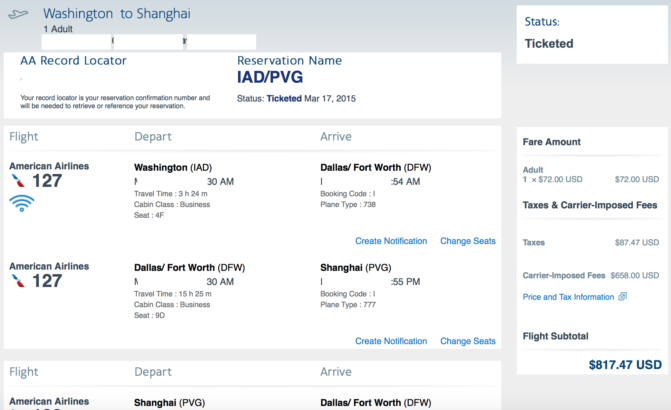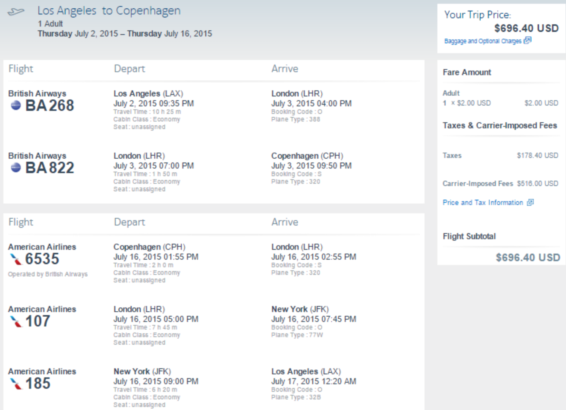This is why consumers still need the Department of Transportation’s consumer protection CFR 399.88: Mistake Fares.
If you are considering booking travel or signing up for a new credit card please click here. Both support LiveAndLetsFly.com.
If you haven’t followed us on Facebook or Instagram, add us today.
What is the CFR 399.88?
Below I have included the whole directive so that you can see it for yourself, what is included and what is not. In layman’s terms here is what the Department of Transportation has said:
If you buy a ticket, the airline cannot come back to you and state that they made a mistake and the ticket will now cost more than what you have paid. They also cannot cancel your ticket and void the order to avoid increasing the costs when you go to re-book it.
§ 399.88 Prohibition on post-purchase price increase.
(a) It is an unfair and deceptive practice within the meaning of 49 U.S.C. 41712 for any seller of scheduled air transportation within, to or from the United States, or of a tour (i.e., a combination of air transportation and ground or cruise accommodations), or tour component (e.g., a hotel stay) that includes scheduled air transportation within, to or from the United States, to increase the price of that air transportation, tour or tour component to a consumer, including but not limited to an increase in the price of the seat, an increase in the price for the carriage of passenger baggage, or an increase in an applicable fuel surcharge, after the air transportation has been purchased by the consumer, except in the case of an increase in a government-imposed tax or fee. A purchase is deemed to have occurred when the full amount agreed upon has been paid by the consumer.(b) A seller of scheduled air transportation within, to or from the United States or a tour (i.e., a combination of air transportation and ground or cruise accommodations), or tour component (e.g., a hotel stay) that includes scheduled air transportation within, to or from the United States, must notify a consumer of the potential for a post-purchase price increase due to an increase in a government-imposed tax or fee and must obtain the consumer’s written consent to the potential for such an increase prior to purchase of the scheduled air transportation, tour or tour component that includes scheduled air transportation. Imposition of any such increase without providing the consumer the appropriate notice and without obtaining his or her written consent of the potential increase constitutes an unfair and deceptive practice within the meaning of 49 U.S.C. 41712.
Why is this important?


Is CFR 399.88 under threat?
Why do we still need it?
- Spirit offers $9 fares to destinations regularly
- Jet Smarter offers private jets for positioning flights as cheap as free for members and as little as $52 for non-members
- RyanAir offers flights for as little as $10.60 for distances of up to 1,000 miles
- American Airlines, United Airlines, Delta Airlines, and Air Canada regularly compete on Chinese routes at $500 fares
- Wow Air from the east coast of the US to Europe for $200 round trip
- Norwegian Air Shuttle offers just over $200 to/from Sweden and Denmark to the US
Which of those are mistakes? None of them.
The opacity of the generation of a fare is part of the problem. The other is bad actors on the business side. There have been instances of companies selling vouchers for “Caribbean Vacations” that are less complete or accurate than a consumer should reasonably expect. Airlines have the potential to change fees once someone has booked, etc. The consumer needs an advocate, and the DoT through CFR 399.88 is that voice.
However, I sense that the DoT will soon give the airlines a little greater protection too. They may have over-compensated in favor of the consumer, and I am okay with some changes. It should be a fair deal for both parties. Remember that if you book the wrong date and do not change outside of the 24-hour window, you are stuck. Even when a consumer makes a mistake (and not the airline) they can be stuck with the consequences. If it’s fair to stick the consumer with the consequences, it’s fair to stick the businesses with the same liability for errors.
It is my hope that when the alteration of the rule is made there will be some correction for the airline, hopefully, the pendulum doesn’t swing too far in the other direction.
What do you think? Should the DoT enforce CFR 399.88?




Leave a Reply